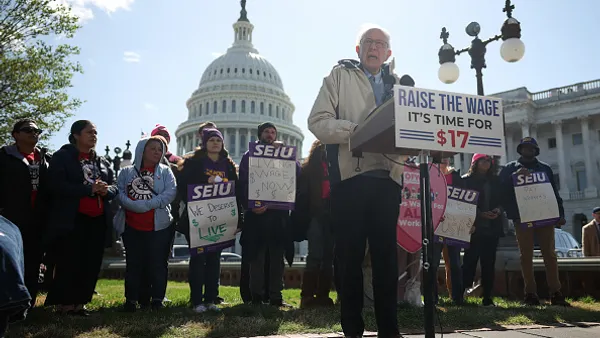Despite burnout and workplace challenges, 80% of U.S. workers surveyed said they feel hopeful about the future of their careers — but not with their current employer, according to a March 21 report from the University of Phoenix Career Institute.
Workers’ optimism is based on their own abilities and confidence about available positions, leading to a “free agent” labor market, the report found. At the same time, many of the 5,000 workers surveyed said they’d stick around if their company offered more upskilling or reskilling opportunities.
“With an unstable economy, retention has become critical — especially for top talent — and employers are looking for solutions beyond office perks and happy hours,” John Woods, provost and chief academic officer at the University of Phoenix, said in a statement.
Workers want “opportunities for mentorship and advocacy, investment in new skills, and internal career advancement,” he said. “If they aren’t getting these opportunities from their current employer, they’ll easily walk.”
Overall, more than half of respondents said they’re actively looking for a new job or expect to start looking in the next six months. About 46% said they were willing to leave if their employer offered a severance package with three months of pay. However, among those who were looking, 68% also said they’d be more likely to stay if their company did more to upskill them.
The report offered several recommendations employers could deploy to retain talent. For instance, investments in training programs may be particularly beneficial, it said. About 40% of workers said their company never provides specific reskilling opportunities. In addition, 70% said if their company gave them more outlets and opportunities to apply new skills, they’d be more likely to stay throughout their career.
Other recent research confirms this idea — that employees are more likely to leave if they aren’t offered training or new skills and more likely to stay if their company invests in their growth. This type of program gained traction among tech companies this year, where team leaders say they plan to reinvest in upskilling current talent rather than recruit new workers.
Mentorship programs also appear to be welcome, according to the institute’s report, especially since mentorship initiatives were reported by fewer workers this year. About 56% of Americans surveyed said they don’t have a mentor, and 42% said they don’t have an advocate in their professional life. On top of that, a third of respondents said the lack of mentorship or advocate has held them back in their careers.
To address burnout and build well-being, employers could also nurture workplace wellness, the report found. A majority — 74% of respondents — said they feel stressed about their job or career. About 39% said they’ve looked for mental health resources to manage their work-related stress.
“What’s more is there’s a growing gap between how employers think they are doing with these foundational career-building opportunities and how employees perceive their employers are doing, which should serve as a wake-up call,” Woods said. “Employers are faced with the reality that transactional benefits are no longer sufficient to achieve employee retention; there is a clear mandate to provide deeper, long-term support for and investment in their workforces.”











